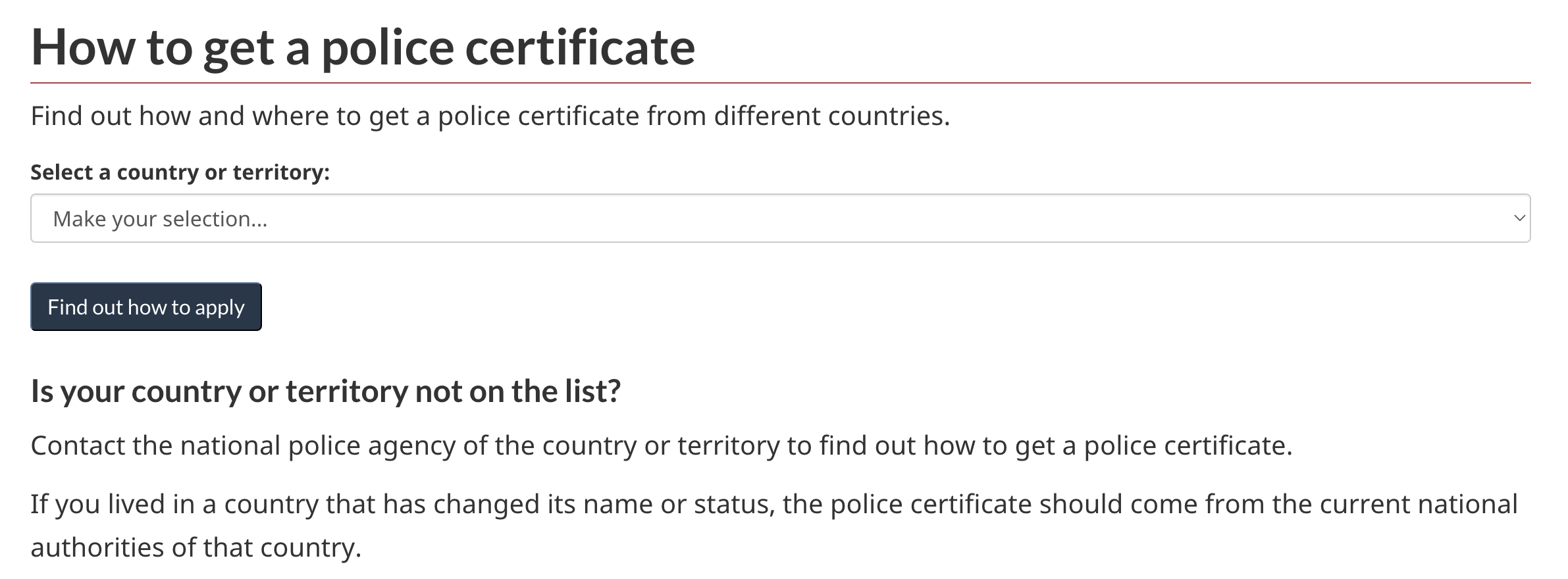Have you ever lived abroad for six months or more on a Working Holiday permit or another type of visa? If so, IRCC may require you to submit a police certificate from that country during the application process for an IEC permit to Canada.
This article offers step-by-step information to get police certificates from various popular countries participating in the Working Holiday program such as Australia, New Zealand, South Korea, Japan, Argentina and Chile. For info on other countries, check out How to get a police certificate.
We’re providing a link to the instructions given by the Government of Canada for each of the countries listed below. Use it for the most up-to-date info as requirements can change.
Will I need a criminal record check from Canada?
Most Working Holiday permit candidates who have lived in Canada for six months or more before submitting their Working Holiday, Young Professionals or International Co-op permit application do not have to provide a police certificate from Canada.
This is the Government of Canada’s reply to the question “How do I give my fingerprints and get an RCMP criminal record check from inside or outside Canada?”
If you have lived in Canada for more than 6 months since the age of 18, the Royal Canadian Mounted Police (RCMP) may ask you for fingerprints to complete your criminal record check.
Do not request a criminal record check unless we send you a letter asking for one.
So in the unlikely event that the Canadian government needs to check your criminal record, you will only be asked for your fingerprints. Based on our experience and community feedback, such a request is very rare.
That said, a PVTistes.net member had to go through the criminal record check process and he explained the process in detail (in French). Read it here for a complete overview of the various steps he described.
If you’ve lived in Australia…
For more details, read the instructions from the Government of Canada. You may need to submit several documents.
National Police Check (all applicants)
Use the Online NPC Application Portal of the Australian Federal Police and pay the AUD42 fee by credit card.
You will have to upload several documents as proof of identity in step 1. Different documents are worth different points and the total must be at least 100. For example, to meet the requirements, you could upload:
- A valid passport (70 points)
- A birth certificate (25 points)
- A bank statement in your name (25 points)
Documents that are not in English must be translated. But based on community feedback, it seems that some of you didn’t necessarily send a translation and documents were accepted regardless. However, it’s not guaranteed!
In the “Purpose of Check” section, select “Commonwealth Employment / Purpose” in the first drop-down menu. In the second drop-down menu, choose “35 – Overseas employment/visa – Supply to a country other than Australia.”
You will need to print and sign a consent form (provided to you during the application) and then submit a scanned version of the requested documents.
Note: The name of the downloaded documents must not exceed 10 characters; otherwise you will get an error message during the upload process.
If you have any questions, head to the forum discussion National Police Check.
Traffic history or licence history report (all former Queensland residents)
If you’ve lived in Queensland, you will also need to provide a traffic history report in addition to the National Police Check. This document lists any traffic offences you’ve committed and any penalties you’ve received.
Even if you did not drive in Queensland or simply don’t have a driver’s license, you will still need to provide proof from the Queensland government that you have never held a driver’s license in Queensland. In this case, you’ll need a licence history report.
You can apply for your traffic history report online, in person or by mail. The fee is AUD27.05. Visa and MasterCard credit and debit cards are accepted, as well as American Express. In your application, you must ask for a report since the age of 18.
If you have never held a Queensland driving licence, you must apply for a licence history report in person or by e-mail or mail (if you are interstate or overseas). A PVTiste.net member successfully applied from overseas and described the steps:
- Fill out form F2121.
- Provide a certified copy of your identity documents (you will need to provide several pieces of ID). Police officers, a consulate or even doctors can certify documents. The document must include the following statement: “I have sighted the original document and certify this to be a true copy of the original.”
- Send a message to the following email address: [email protected]. In your email, you must include the completed form, and the certified copies of your identity documents and indicate (in English), the purpose of your application (applying for a Canadian visa).
- A few days later, you will receive a link from the Queensland government to pay the fee online with your bank card.
- You will have to send the payment confirmation received by email (to link your application to the proof of payment).
The pvtistes.net member reported getting her licence history the following day but other information suggests that it takes about 10 working days.
Check out this discussion on the forum for further info!
Driver license history report (all former Victoria residents)
If you’ve lived in the state of Victoria, you will also need to provide a driver’s licence history report in addition to the National Police Check.
If you didn’t drive in Victoria or if you don’t even hold a Victorian driver’s license in Victoria, you will need to provide proof issued by the government of Victoria that you have never held a driving license in the State of Victoria. In this case, send an email in English to the following address: [email protected]. Provide as much information as possible, including the reason for your request (work permit application for Canada), your address(es) when you lived in this state, your name(s), first name(s), date and place of birth, citizenship and your contact details. It takes about 10-15 days to get a reply.
If you did drive in the state of Victoria, request a driver history report online. The application costs AUD20.70. Visa and Mastercard are accepted. You will need to provide your driver’s license number.
If you’ve lived in New Zealand…
For more details, read the instructions from the Government of Canada.
You must apply for a “Criminal record check”, also called a “criminal conviction history”.
You have to complete a digital or paper version of the application form.
You will also need to provide a valid ID, for instance, a valid passport or a New Zealand driving license.
The good news is that criminal record checks are free. Processing time is generally 20 days.
If you have any questions, head to this thread in our forum.
If you’ve lived in Japan…
For more details, read the instructions from the Government of Canada.
Officially, you must first get a letter from IRCC asking you to provide a police certificate. You should receive it once you submit your work permit application (i.e. after receiving an invitation to apply).
If you’re outside Japan, you will likely have to make an appointment and go to the nearest embassy or consulate of Japan because you may be asked to give your fingerprints.
It takes about two months to get your police certificate. You will need to collect it in person, although using a representative may be acceptable under certain conditions.
Note this important feedback from a pvtistes.net member:
“Contrary to what is indicated on the IRCC website, it’s not necessary to wait for the letter from IRCC to request a police certificate at your local consulate or embassy of Japan.
Just book an appointment to have your fingerprints taken, bring your passport and fill out the application.
Getting your police certificate takes about two months, so plan for it if you’ve lived in Japan for more than six months. A few of us recently waited for the letter because we didn’t know we didn’t have to and we wasted two months waiting for the police certificate. Apply when you give your biometrics—both processes take about the amount of same time.”
If possible, try to keep proof of your police certificate request to let IRCC know that you’ve already initiated the process.
Some candidates reported that ultimately, their police certificate from Japan was never requested by IRCC.
If you’ve lived in South Korea…
For more details, read the instructions from the Government of Canada.
If you’re still in South Korea as a foreign national, you should be able to request your background check (criminal records) certificate at any police station with a foreign affairs division. Otherwise, you will have to go to the nearest embassy of South Korea.
You will have to bring your passport (current passport and passport used in Korea), a passport-size picture, a copy of your Foreign Registration card or a copy of your Korean visa. There is no fee for the certificate and normal processing time is about a week.
If you have any questions, just go to the forum!
If you’ve lived in Hong Kong…
For more details, read the instructions from the Government of Canada.
First, download and complete the Certificate of No Criminal Conviction (CNCC) application form.
Your application must include the original of a full set of the applicant’s fingerprints taken by a law enforcement agency/Consulate where you presently reside. You may also go through a commercial agency authorized by overseas law enforcement agencies or consulates. Check this page for the full details of documents and forms to provide, including the request letter from IRCC.
The payment is the tricky part because credit card/electronic/online/telegraphic transfer of money/electronic cheque or cash sent by mail is not accepted. The processing fee is HK$250 per person and it must be paid in bank draft, made payable to “The Government of the Hong Kong Special Administrative Region”. Alternatively, a contact in Hong Kong can submit the application on your behalf and pay the fee in cash/Octopus Card/EPS in the local office.
The Government of Hong Kong authorities will forward your CNCC directly to IRCC.
Read Xavier’s experience in the Hong Kong police certificate discussion or share your own experience.
If you’ve lived in Taiwan…
For more details, read the instructions from the Government of Canada.
If you are still in Taiwan, you can apply for your Police Criminal Record Certificate (PCRC) at the Taipei City Police Department (in person, online, or by mail). Information in English is available here. Allow two hours for an in-person application. The fee is NT$100.
Overseas applications must be mailed to the following address:
Foreign Affairs Division,
Taipei City Police Department
No. 96, Yanping S. Rd., Zhongzheng District
Taipei 10042, Taiwan (Republic of China)
You must send the application form, a copy of your passport or an Alien Resident Certificate that is authenticated or notarized by ROC embassies or consulates, Straits Exchange Foundation or other relevant notary public abroad, the US$7 application fee and a self-addressed envelope.
For more information check out this discussion.
If you’ve lived in Argentina…
For more details, read the instructions from the Government of Canada.
IRCC requires the Certificado de Antecedentes Penales (emitido con excepción al artículo 51 del Codigo Penal Argentino).
If you’re in Argentina, you can apply in person or online at the Registro Nacional de Reincidencia in Buenos Aires or any of its other offices throughout the country. You will receive a security code that will give you access to the certificate online.
If you’re overseas, you must apply online. It takes 24 hours to get the document (ARP300), but only an hour if you pay the “express” fee of ARP980. Simply fill in the online form with your personal information, including your name, passport number, etc., and proceed with the payment.
For more information, read this discussion.
If you’ve lived in Chile…
For more details, read the instructions from the Government of Canada.
IRCC requires two documents, the Certificado Antecedentes Fines Especiales (for criminal convictions) and the Hoja de Vida del Conductor (for driving convictions).
You can apply at a Chilean embassy or consulate in your country of residence or apply online (go to “antecedentes”). You will need your RUN or RUT number during the process. If you apply online, you will be able to download the document at the end of the process.
There is no charge if you apply online.
The documents will be in Spanish so you should submit them to IRCC along with a certified translation in English or French.
For more information head over to this thread in our forum.
If you’ve lived in Colombia…
For more details, read the instructions from the Government of Canada.
IRCC requires a Background Verification Certificate and all requests must go through one of these two designated service providers:
Feedback from other applicants may be useful to you, especially the experience of member “D101” with the two providers mentioned above. Apparently, processing times are quite long.
If you’ve lived in Mexico…
For more details, read the instructions from the Government of Canada.
IRCC requires a document called the “Constancia de datos registrales.”
If you live outside Mexico, IRCC will tell you if you need a police certificate. If so, they will submit a request on your behalf after you provide two sets of original fingerprints. For instructions on where to have your fingerprints taken, contact your local embassy or consulate of Mexico. Most will send you to a police station.
You will have to send the following to the embassy of Canada in Mexico: passport-size pictures, a copy of your passport ID page and file information (e.g. your file number, the name of the visa office, Canadian embassy or consulate or case processing centre where your file is being processed, as well as your full name and date of birth).
The Embassy of Mexico in Canada normally forwards the document directly to IRCC.
We recommend keeping proof that you sent all the requested documents. For instance, take a photo of the envelope just before mailing it (preferably already stamped by the postal services) and scan various documents submitted before combining them into a single PDF file. This way, you can prove you followed the process as requested.
For more information, head over to this forum discussion.
If you’ve lived in Uruguay…
For more details, read the instructions from the Government of Canada.
IRCC requires you to apply for a “Certificado de Antecedentes Judicial”.
If you have a piece of ID from Uruguay (Usuario Gub.Uy, Identidad Mobile – Abitab or TuID – Antel), you can apply online.
If you live outside Uruguay or don’t have the IDs mentioned above, a representative must apply on your behalf to the Dirección National Police – Tecnica.
The fee is UI26.50 and it takes about 15 days to get your document.
For more information, check out the forum.
If you’ve lived in Russia…
For more details, read the instructions from the Government of Canada.
IRCC requires a reference certificate (Spravka o nalichii (otsutstvii) sudimosti (“Statement of the presence (absence) of convictions and (or) facts of criminal prosecution or termination of criminal prosecution.”)
If you’re outside Russia, you must apply in person to the Consular Section of your nearest Embassy of Russia [or give a representative power of attorney to apply on your behalf] or apply via a representative to the Main Information and Analytical Centre in Moscow.
If you have any questions, join the discussion on the forum.
If you’ve lived in another country…
The world is a big place, so you may need a police certificate from another country not listed here. Simply go to How to get a police certificate and select the country from the drop-down menu. You will get the most up-to-date instructions from the Governement of Canada to complete the process successfully.

As usual, don’t hesitate to ask questions and share experiences on our forum. We have an entire section dedicated to police certificates. Use the filters to find info about specific countries.
Good luck!
















 Français
Français English
English




0 comments
{{like.username}}
Loading...
Load more